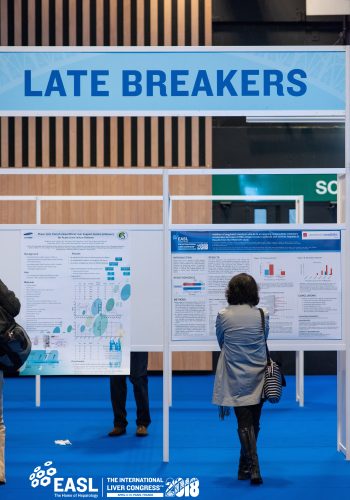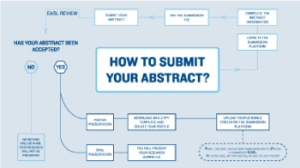Late-breaker abstract submission now closed.
Thank you for your continued interest in participating
at The International Liver Congress™ 2019.
Submission timeline
| 04 October 2018 | Abstract*& case submission opens |
| 21 November 2018 (23:59 CET) |
Abstract submission closes |
| 25 January 2019 | Abstract notifications |
| 31 January 2019 | Final day to withdraw accepted abstracts and/or to request modifications of titles and author lists |
| 04 February 2019 | Late-breaker** submission opens |
| 13 February 2019 (23:59 CET) | Late-breaker abstract submission closes |
| 07 March 2019 | Late-breaker abstract notifications |
*There is an EUR 50 non-refundable fee (no VAT) for submitting a regular abstract.
**There is an EUR 100 non-refundable fee (no VAT) for submitting a late-breaker abstract.
Late-breaking abstracts submission

Late-breaker abstract submission period is now closed.
The late-breaker category is exclusively devoted to novel and practice-changing studies or outstanding scientific discoveries, and is aimed at selecting abstracts with unique data that would not have been otherwise presented at the ILC.
This category is NOT intended as an extension of the regular submission deadline, and the results should not have been fully available by the regular abstract submission deadline.
If your abstract is accepted, the handling fee of EUR 100(no VAT), that was requested when submitting an abstract, will cover the following:
- Free printing of your paper poster
- Free delivery to the congress venue
- Free hanging and display of abstract in the poster board area
All you need to do is arrive on time on the day of your presentation – we take care of the rest!
Abstract submission guidelines
Prepare for your abstract submission, download our checklist!
Abstracts may only be submitted online via the abstract submission platform. Abstracts submitted by fax or email will not be accepted.
Bursaries are available for young investigators.
Language: All abstracts must be submitted and presented in English. Please use UK English spelling and have your abstract proofread for grammar and syntax.
During the online abstract submission process you will be guided through the different steps enabling you to successfully submit your work. The structure of the abstract will be defined as follows:
Abstract topic: Please choose from the abstract categories available. Carefully select the adequate topic for your abstract submission. Misplaced abstracts may be rejected. Abstracts relating to the same study should not be split and submitted in the same topic category.
Title: The title of your abstract should be precise and explicit. The number of characters in your title should be between 50 and 250 maximum.
Authors: List all authors with their affiliations (institution, city and country). Email addresses must be indicated.
Authorship: Credit for authorship requires substantial contributions to the conception and design; or the acquisition, analysis, or interpretation of the data, final approval of the version to be published, and agreement to be accountable for all aspects of the work in ensuring that questions related to the accuracy or integrity of any part of the article are appropriately investigated and resolved. Please make sure you have the approval of your co-authors to submit their name and email details.
Abstract body: The use of the template available on the abstract submission platform is mandatory. Abstracts should be between 500 and 2,500 characters including spaces (excluding title and authors). Do not use abbreviations, footnotes or references in the abstract. Do not include title, authors and affiliation in the template.
You should structure your abstract using the following headings:
- Background and aims
- Methods
- Results
- Conclusions: avoid evasive statements like “the findings will be discussed”
Figure/tables: Only one of the following is allowed per abstract:
- Images: Images should be pasted under “figure” in the template in JPG/BMP format, maximum width 9cm, and resolution up to 150dpi. Please note that these may be resized to fit in the final printed material.
- Graphs: Graphs should be pasted under “figure” in the template with similar resolution and size as depicted above.
- Tables: Tables have to be added as a table and not as an image in the template. The characters used in the table count toward the total character count of the abstract (max 2500)
Disclosures: The conflict of interest of all authors must be indicated by the submitting author. If your research has been granted any commercial or institutional support, you will be asked to disclose this during the submission process.
Drugs and chemicals: Generic names of drugs and chemicals should be provided. If trademarks are mentioned, the manufacturer’s name and city should also be given. All funding sources supporting the work, either public or private, especially those from pharmaceutical companies, must be provided.
| Nurses and AHP research in Hepatology |
| Acute liver failure and drug induced liver injury |
| Alcoholic liver disease |
| Autoimmune and chronic cholestatic liver disease: Clinical aspects |
| Autoimmune and chronic cholestatic liver disease: Experimental and pathophysiology |
| Cirrhosis and its complications: Clinical |
| Cirrhosis and its complications: Experimental and pathophysiology |
| Cirrhosis: ACLF and Critical illness |
| Fibrosis |
| Gut microbiota and liver disease |
| Imaging and drug targeting |
| Immunology except viral hepatitis |
| Liver development, physiology and regeneration |
| Liver development, physiology and regeneration |
| Liver transplantation and hepatobiliary surgery: Clinical aspects |
| Liver transplantation and hepatobiliary surgery: Experimental |
| Liver tumours: Clinical aspects except therapy |
| Liver tumours: Experimental and pathophysiology |
| Liver tumours: Therapy |
| NAFLD: Clinical aspects except therapy |
| NAFLD: Diagnostics and non-invasive assessment |
| NAFLD: Experimental and pathophysiology |
| NAFLD: Therapy |
| Non-invasive assesment of liver disease except NAFLD |
| Public Health |
| Rare liver diseases (including pediatric and genetic) |
| Viral hepatitis A, B, C, D, E: Immunology |
| Viral hepatitis A, B, C, D, E: Virology |
| Viral hepatitis A/E: Clinical aspects |
| Viral hepatitis B/D: Clinical aspects except therapy |
| Viral hepatitis B/D: therapy |
| Viral hepatitis C: Clinical aspects except therapy |
| Viral hepatitis C: Post SVR and long term follow up |
| Viral hepatitis C: Therapy and resistance |
Abstracts that have previously been published or presented in non-EASL International Gastroenterology/Hepatology meetings will NOT be accepted. Please ensure that your abstract has never been presented before. If this rule is not respected, the abstract will be rejected and will not be considered.
Exception: Any abstract submitted for presentation at any 2018-2019 EASL event (monothematic, special conferences or summits) may be submitted and will be considered for presentation at The International Liver Congress™ 2019.
The presenting author of an accepted abstract must attend and register for the congress. All accepted abstracts will be published in a supplement of the Journal of Hepatology.
Additions or removal of author names will be permitted until 31 January 2019. After this date no further changes in the abstract will be possible. Any changes in the abstract title or body will not be possible after the submission deadline 21 November 2018 (new extended deadline).
After acceptance of the abstract, requests for withdrawal of an abstract must be received in writing to ILC.abstracts@easloffice.eu by 31 January 2019 to avoid publication in the Journal of Hepatology supplement and final programme. Any withdrawal requested after that date will not be considered and the abstract will be published in the Journal of Hepatology supplement.
For late-breaker abstracts, changes in the abstract title or body will not be possible after the submission deadline 13 February 2019. No additions or removal of author names will be permitted after 07 March 2019. Requests for withdrawal of an abstract must be received in writing to ILC.abstracts@easloffice.eu by 07 March 2019 to avoid publication in the Journal of Hepatology supplement and final programme. Any withdrawal requested after that date will not be considered and the abstract will be published in the Journal of Hepatology supplement if the abstract is accepted.
Make sure you disclose the following during the abstract submission process:
- For each author, any relevant financial relationship with the provider of commercial products or services discussed in their educational presentation or that have directly supported the CME activity through an educational grant to the sponsoring organization(s).
- If the product, that is discussed in the abstract, is not labelled for the use under discussion or that the product is still investigational.
The intent of disclosure is not to prevent a participant with financial or other relationships from making a presentation, but rather to provide participants with adequate information about the relationship(s).
EASL relies upon scientific committee members, session chairpersons, moderators, invited faculty and speakers participating in its CME programmes to provide educational information that is objective and free from bias. In this spirit, EASL follows those guidelines as set forth by the EACCME Standards for Commercial Support, to disclose the existence of any relevant financial interest or other relationship the faculty member (spouse or partner) or provider has with the manufacturer of any commercial product discussed in an educational presentation.
By submitting an abstract to the ILC 2019:
You will hereby assign the copyrights to the European Association for the Study of the Liver (EASL) in the abstract (government authors not electing to transfer, agree to assign an exclusive publishing and distribution license) and any supplementary tables, illustrations or other information submitted therewith, that are intended for publication as part of the abstract, in all forms and media (whether now known or hereafter developed), throughout the world, in all languages, for the full term of copyright, effective when and if the article is accepted for publication. This transfer includes the right to provide the abstract in electronic and online forms and systems.
Abstracts for The International Liver Congress™ 2019 will be published online as follows:
On 27 March 2019 at 10:00 CET a large quantity of abstracts, including some late-breaker abstracts, will be posted online showing abstract title, author names and abstract data. These abstracts are publicly available and can be reported on from this time onwards.
A smaller quantity of abstracts, including some late-breaker abstracts, will be retained and presented during The International Liver Congress™ 2019 official Press Office activities and/or in official Press Office materials. These abstracts will be made available to media at 07:00 CET on the day the abstract is presented at the Congress and can be reported on from this time. Any earlier reporting will be in violation of the embargo.
If you have questions regarding abstracts or need assistance, please contact the abstract team at ILC.abstracts@easloffice.eu.
Abstract hotline: +41 (0)22 807 29 71 (CET office hours)
After having submitted your abstract, you will receive a confirmation by e-mail with your abstract reference number.
If you do not receive a confirmation e-mail please contact the abstract team ILC.abstracts@easloffice.eu.
Should you wish to make corrections to an already submitted abstract, or if you wish to submit other abstracts later, you may use your personal access codes. Corrections to regular abstracts can only be made up to the submission deadline: 21 November 2018 (new extended deadline).
Corrections to late-breaker abstracts can only be made up to the late-breaker submission deadline: 13 February 2019.
If an abstract is accepted, the person designated as the presenting author must attend the congress to present the data in person. Acceptance of the abstract implies payment of the registration fee by the presenting author.

